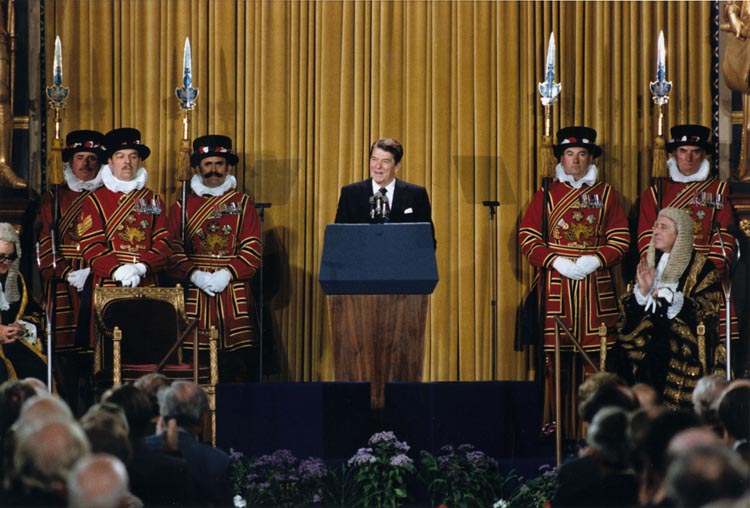
June 8 marks the 34th anniversary of President Ronald Reagan’s historic address to the British Parliament.
While many remember his speech for his bold declaration that “Marxism-Leninism” would be left “on the ash heap of history,” tragically, it seems that modern audiences have forgotten what Reagan proposed to help bring about this magnificent transformation. His speech wasn’t a call for military to defeat communism and “other tyrannies,” but a call for ideology. He called for Western leaders to undertake a “campaign to assist democracy.”
As the two major political parties gather for their conventions, it’s worth asking ourselves how many of today’s political leaders would stand ready to answer Reagan’s call?
In 2016, we’ve heard some of the leaders in each party brush off the idea that America would build into our foreign policy a push for expanding democracy and human liberty by bluntly declaring that America shouldn’t “impose” democracy on others. Never mind that it’s unclear how democracy, which only exists with the consent of the governed, could ever be “imposed” from the outside. This argument is a repudiation of nearly everything that Reagan stood for on the world stage.
In 1982, he proclaimed, “We must be staunch in our conviction that freedom is not the sole prerogative of the lucky few, but the inalienable and universal right of all human beings.” As if responding to future politicians bristling at the idea of American exceptionality, he went on to assert that his push to “foster the infrastructure of democracy” was not “cultural imperialism, it is providing the means for genuine self-determination and protection for diversity.”
In 2016, some politicians have implied that non-Western nations are somehow incapable of becoming democracies and their citizens unready to take advantage of what democracy affords: the opportunity for true self-governance.
In 1982, Reagan called this thinking “cultural condescension or worse.” He almost sounded scolding when he went on to ask his audience, “Who would voluntarily choose not to have the right to vote, decide to put purchase government propaganda handouts instead of independent newspapers, prefer government to worker-controlled unions, opt for land to be owned by the state instead of those who till it, want government repression of religious liberty, a single political party instead of a free choice, a rigid cultural orthodoxy instead of democratic tolerance and diversity?”
In the three-plus decades since Reagan’s call, the number of democracies in the world has doubled. However, the growth in citizen-centered, citizen-responsive governments hasn’t been without periods of setback and losses. This last decade, in particular, has had dark moments as Moscow and Beijing-style authoritarianism has asserted itself in some quarters.
In 1982, however, when the odds against democracy’s expansion seemed far greater than they do now, our 40th president firmly believed that we should stand as a beacon for democracy and human liberty. He said, “I’ve often wondered about the shyness of some of us in the West about standing for these ideals that have done so much to ease the plight of man and the hardships of our imperfect world.”
Every Republican leader seems to claim Reagan as inspiration or even role model. Every Democrat seems to marvel at the transformational nature of the Reagan presidency. Perhaps they should dust off his remarks at Westminster on June 8, 1982.
Top